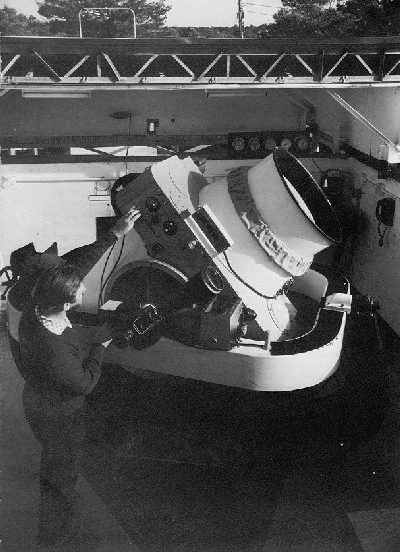Joseph Nunn on:
[Wikipedia]
[Google]
[Amazon]

 Joseph Nunn (1905–1968) was an American
Joseph Nunn (1905–1968) was an American NASA, ''Vanguard: A History'', Chapter 11, "From ''Sputnik I'' to TV-3."
/ref> An STP network of the 12 cameras were built by August 1958. The cameras remained in operation until 1991, when they were decommissioned. At least one of the cameras was later refurbished for use in the Asteroid tracking program. Joseph Nunn lived in
The first Baker-Nunn camera. Left to right, Clyde Chivens, Harry Boller, Joseph Nunn. Source: Photograph provided by Don Winans, scanned and posted by Peter Abrahams
1905 births 1968 deaths American optical engineers Engineers from California People from Pasadena, California People from San Marino, California 20th-century American engineers {{US-engineer-stub

engineer
Engineers, as practitioners of engineering, are professionals who Invention, invent, design, build, maintain and test machines, complex systems, structures, gadgets and materials. They aim to fulfill functional objectives and requirements while ...
.
In 1956 he worked in collaboration with Dr. James G. Baker to design and manufacture a series of satellite
A satellite or an artificial satellite is an object, typically a spacecraft, placed into orbit around a celestial body. They have a variety of uses, including communication relay, weather forecasting, navigation ( GPS), broadcasting, scient ...
tracking camera
A camera is an instrument used to capture and store images and videos, either digitally via an electronic image sensor, or chemically via a light-sensitive material such as photographic film. As a pivotal technology in the fields of photograp ...
s. These were called Baker-Nunn camera
A Schmidt camera, also referred to as the Schmidt telescope, is a catadioptric Astrophotography, astrophotographic Optical telescope, telescope designed to provide wide Field of view, fields of view with limited Aberration in optical systems, abe ...
s after their designers, and consisted of a very precise tracking system combined with an unusually large, wide-field camera for photographing large areas of the sky. Joseph Nunn was responsible for designing the mechanical elements of these cameras, while Dr. Baker worked on the camera. The optics were fabricated by the Perkin-Elmer Corporation, and the camera was assembled by Boller and Chivens
Boller and Chivens was an American manufacturer of high-quality telescopes and spectrographs headquartered in South Pasadena, California.
History
Founded about 1946 by Harry Berthold Boller (1915-1997) and Clyde Cuthbertson Chivens (1915-2008). ...
.
This camera provided tracking data on the Soviet Union
The Union of Soviet Socialist Republics. (USSR), commonly known as the Soviet Union, was a List of former transcontinental countries#Since 1700, transcontinental country that spanned much of Eurasia from 1922 until Dissolution of the Soviet ...
's Sputnik I
Sputnik 1 (, , ''Satellite 1''), sometimes referred to as simply Sputnik, was the first artificial Earth satellite. It was launched into an elliptical low Earth orbit by the Soviet Union on 4 October 1957 as part of the Soviet space program ...
satellite./ref> An STP network of the 12 cameras were built by August 1958. The cameras remained in operation until 1991, when they were decommissioned. At least one of the cameras was later refurbished for use in the Asteroid tracking program. Joseph Nunn lived in
Pasadena
Pasadena ( ) is a city in Los Angeles County, California, United States, northeast of downtown Los Angeles. It is the most populous city and the primary cultural center of the San Gabriel Valley. Old Pasadena is the city's original commercial d ...
and San Marino, California
San Marino is a city in Los Angeles County, California, United States. It was incorporated on April 25, 1913. At the 2020 United States census the population was 12,513, a decline from the 2010 United States census.
History Origin of name
Th ...
. He was a nephew of American entrepreneur and educator L.L. Nunn.
The crater Nunn on the Moon
The Moon is Earth's only natural satellite. It Orbit of the Moon, orbits around Earth at Lunar distance, an average distance of (; about 30 times Earth diameter, Earth's diameter). The Moon rotation, rotates, with a rotation period (lunar ...
is named after him.
References
External links
The first Baker-Nunn camera. Left to right, Clyde Chivens, Harry Boller, Joseph Nunn. Source: Photograph provided by Don Winans, scanned and posted by Peter Abrahams
1905 births 1968 deaths American optical engineers Engineers from California People from Pasadena, California People from San Marino, California 20th-century American engineers {{US-engineer-stub